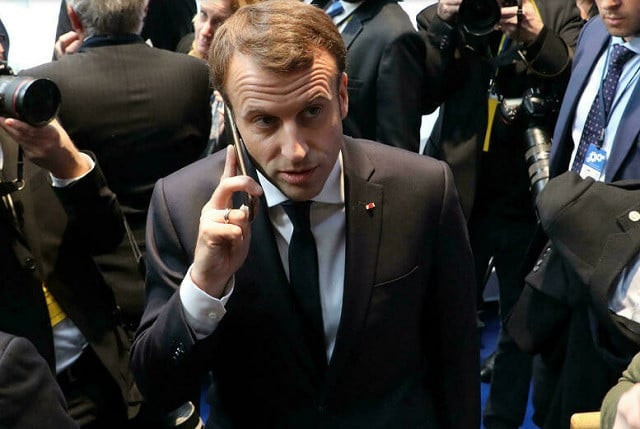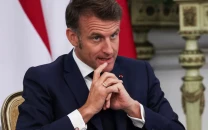Pegasus spy claims probed as Macron switches phone
French president orders 'strengthening of security protocols' following potential breach

Hungary, Israel and Algeria on Thursday probed allegations that Israeli-made spyware was used on journalists, rights activists and 14 heads of state, as French leader Emmanuel Macron ordered tighter security and changed his phone over espionage concerns.
President Macron -- whose name was on a list of alleged targets -- ordered "a strengthening of all security protocols" following a specially convened meeting of the nation's Defence Council, his office said.
Macron "has himself changed his phone and number for certain exchanges", it said.
The NSO Group's Pegasus software -- able to switch on a phone's camera or microphone and harvest its data -- is at the centre of a growing storm after a list of about 50,000 potential surveillance targets was leaked to rights groups.
Amnesty International and French media nonprofit Forbidden Stories collaborated with a clutch of media companies, including the Washington Post, the Guardian and Le Monde, to analyse and publish the list.
The widening scandal is drawing in countries from Saudi Arabia and the United Arab Emirates to Morocco, India and a host of other mostly emerging economies.
Hungary was the only EU country listed as a potential user of the spyware, with hundreds of targets including journalists, lawyers and other public figures.
Hungarian prosecutors said on Thursday they had opened a probe "to establish the facts and to determine whether and, if so, what crime has taken place", the Budapest Regional Investigation Prosecutor's Office said.
Weapon of choice
Foreign Minister Peter Szijjarto has insisted the government "has no knowledge of such data collection", while some critics decried the move as a time-wasting manoeuvre.
"They have years to investigate if they want... This is merely an administrative step," said Andras Lederer from the Helsinki Committee for Human Rights.
NSO insists its software is only intended for use in fighting terrorism and other crimes, and that it exports to 45 countries, with approval from the Israeli government.
Read Pegasus scandal shows risk of Israel's spy-tech diplomacy: experts
The Israeli government said it has set up a commission to review the software.
The priority was "to review this whole matter of giving licences," lawmaker Ram Ben Barak, a former deputy head of the Mossad spy agency, told Army Radio.
Pegasus had "exposed many terror cells", he said, but "if it was misused or sold to irresponsible bodies, this is something we need to check".
NSO would "be very pleased if there were an investigation, so that we'd be able to clear our name", Chief Executive Shalev Hulio told Army Radio on Thursday.
Algeria's public prosecutor also ordered an investigation into media reports that the north African country may have been a target.
"NSO's spyware is a weapon of choice for repressive governments seeking to silence journalists, attack activists and crush dissent," Amnesty chief Agnes Callamard said.
'Lies and fake news'
Evidence of an attempted hacking was found on the phone of former French environment minister and close Macron ally Francois de Rugy, with the attempt allegedly originating in Morocco, according to the media reports.
Morocco is suing Amnesty and Forbidden Stories in France and "does not intend to let the multiple lies and fake news spread these past few days go unpunished", said Olivier Baratelli, a lawyer for the government.
A first hearing is set for October 8, though a trial might not open for another two years.
Saudi Arabia and the United Arab Emirates, meanwhile, dismissed allegations of their involvement.
UAE's foreign ministry on Thursday said the allegations "are categorically false" and "have no evidentiary basis".
Saudi Arabia's official SPA news agency reported an official source saying "such allegations are untrue, and that (the country's) policies do not condone such practices".






1724148693-0/BeFunky-collage]_____-(24)1724148693-0-208x130.webp)











COMMENTS
Comments are moderated and generally will be posted if they are on-topic and not abusive.
For more information, please see our Comments FAQ